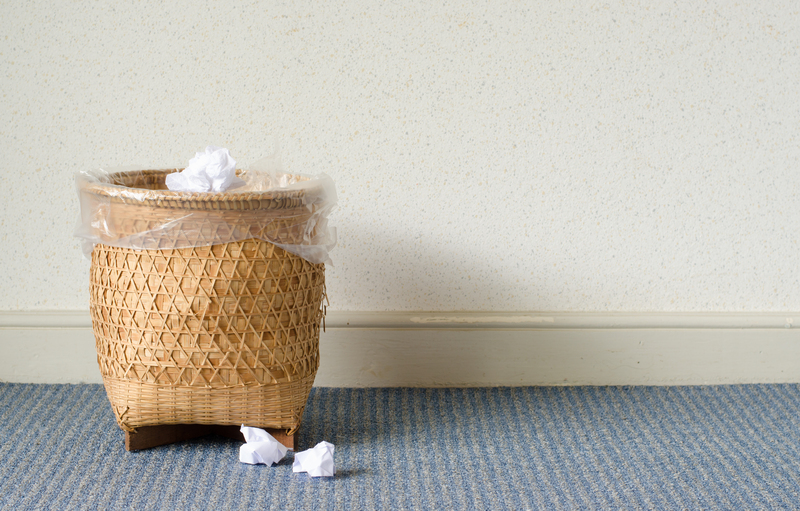Pocket-Friendly Methods for Disposing of Bulky Waste Items
Are you struggling with bulky waste disposal without breaking the bank? From old furniture to malfunctioning appliances, getting rid of large unwanted items can be both a hassle and an unexpected expense. Fortunately, there are several affordable ways to handle this common problem. This guide covers everything you need to know about economical bulky item removal, including eco-friendly solutions, community resources, and smart strategies to make your life easier and your wallet happier.
Understanding Bulky Waste: What Counts As Bulky Waste?
Before exploring disposal methods, it's important to define what is considered bulky waste. Generally, bulky waste refers to items that are too large or heavy to fit in regular trash bins for curbside collection. This includes:
- Old sofas, couches, recliners, or lounge chairs
- Mattresses and bed frames
- Large appliances (refrigerators, washing machines, stoves)
- Carpets, rugs, and padding
- Desks, tables, and chairs
- Exercise equipment and outdoor grills
- Large electronics (televisions, home theaters)
These items require special disposal due to size, materials, or complexity. Understanding what qualifies helps you find the right and most budget-friendly solution.

Top Pocket-Friendly Methods for Bulky Waste Disposal
1. Check Your Local Municipality Services
Many cities and towns offer free bulky waste collection days or scheduled pickups, especially for large items. Start by visiting your city's or county's official website and search for waste disposal or sanitation services. Sometimes these pick-ups are included with your regular trash service -- all you need to do is schedule a pick-up.
- Look for Free Collection Events: Municipalities may host quarterly or yearly events where residents can dispose of large items at no charge.
- Waste Transfer Stations: Some jurisdictions operate drop-off points where you can take bulky waste on your own schedule, often at a reduced fee for residents.
Pro Tip: Always call ahead or check online for accepted items, volume limits, and special requirements (e.g., freon removal for appliances). Compliance ensures your items are picked up and saves you from potential fines.
2. Donate Usable Items to Charity
One of the most responsible and cost-effective ways to get rid of bulky waste items is donating them, provided they're in decent, reusable condition. Many non-profit organizations, such as Habitat for Humanity ReStores, The Salvation Army, and Goodwill, accept furniture, mattresses, and appliances. Some charities offer free pick-up services for large donations.
- Tax Deduction: Donations to qualified charities may be tax-deductible, giving you extra value.
- Extends Product Life: Donating keeps items out of landfills, benefiting the environment as well as someone in need.
- Convenience: No need to haul items yourself if pick-up is available.
Tip: Confirm the organization's wishlist and requirements before scheduling a donation pick-up to avoid unnecessary trips.
3. Sell or Give Away Large Items Online
Who says you can't turn trash into treasure? If your bulky items are in fair-to-good shape, consider using online platforms to sell or give away furniture and appliances. This not only helps declutter your space but also recoups some value and saves on disposal costs. Try these popular options:
- Facebook Marketplace
- Craigslist
- OfferUp
- Freecycle Network (ideal for giveaways)
- Nextdoor
Strategies for Quick, Hassle-Free Disposal:
- Post Clear Photos: Show the item's condition so buyers know what to expect.
- Provide Detailed Descriptions: Size, brand, color, and any flaws.
- List as "Curb Alert": For instant removal, list as free for pick-up at curbside.
Selling or giving away items can be a win-win solution for both your wallet and the environment!
4. Creative Upcycling and Repurposing
Rather than spending money on disposal, why not transform your old, bulky items into something new and functional? Upcycling is the process of creatively reusing materials to make useful home goods, art, or even new furniture. Examples include:
- Turning old doors or tabletops into bookshelves or garden benches
- Upcycling dressers into stylish bathroom vanities
- Converting pallets into outdoor seating areas
- Repurposing washer drums into fire pits or planters
Search for DIY tutorials online -- you might surprise yourself with the possibilities! Repurposing is not only one of the cheapest bulky waste solutions, but it also supports sustainability and adds a personal touch to your home.
5. Use Community Bulk Waste Collection Points
Several neighborhoods and apartment complexes offer communal bulk waste drop-off zones. These spots enable residents to leave large, unwanted items for a limited time each month. The costs are often covered through homeowners' association (HOA) dues or part of your rent.
- Ask property managers about bulk item disposal options and times.
- Follow guidelines for item placement and preparation (e.g., removing doors from refrigerators for safety).
- Be mindful of prohibited items such as hazardous waste, paints, or tires.
Tip: Team up with neighbors for a community clean-up event or bulk item swap to make the process more fun and environmentally efficient!
6. Rent or Borrow a Truck for DIY Disposal
For those comfortable with a bit of heavy lifting and transportation, renting (or borrowing) a truck is a cost-effective way to dispose of large waste items. Gather your unwanted items and take them directly to the nearest landfill, recycling center, or donation site.
- Coordinate with Friends or Neighbors: Split truck rental costs for a group disposal day.
- Plan Ahead: Research local drop-off facility hours and fees. Many sites charge based on weight or item type.
- Reuse and Recycle: Only dump true waste; recycle or donate what you can to minimize fees and landfill impact.
DIY hauling gives you flexibility and can be cheaper than hiring a junk removal service if you have access to a suitable vehicle.
7. Partner with Local Scrap Dealers or Junk Haulers
Many scrap metal dealers and small-scale junk haulers will pick up bulky metal items--like old appliances or exercise equipment--often for little or no cost (since they profit from recycling the materials). Be sure to:
- Contact multiple vendors for quotes or free removal options
- Separate metal from other materials if possible to increase value
- Read reviews or ask neighbors for reliable, licensed recommendations
Note: Always check your municipality's rules regarding hiring private junk haulers to avoid illegal dumping.
8. Leverage Retailer Take-Back Programs
If you're replacing an old appliance or piece of furniture, ask the retailer about their take-back or removal programs. Many major stores offer free or discounted haul-away services with a new purchase. This can save both time and money, ensuring your bulky waste is disposed of responsibly, often through certified recycling partners.
- Appliance replacement (washers, fridges, stoves)
- Mattress delivery (many mattress retailers pick up your old one for free or a small fee)
- Large furniture swaps (check with both big box stores and local furniture outlets)
Read the fine print and make arrangements during your purchase to maximize benefits.
9. Explore Freecycle Events and Local "Junk Days"
Freecycle groups and local junk days encourage community members to give away or swap bulky items, keeping useful products in circulation. You can find opportunities through:
- Online neighborhood groups (Facebook, Nextdoor)
- Churches, schools, and non-profit organizations
- Community bulletin boards
Tip: Join Freecycle.org or similar sites to post your items or see what others are offering. It's a reliable, no-cost solution for bulky waste disposal that helps neighbors and the environment!
Environmental and Legal Considerations for Large Waste Disposal
Disposing of bulky waste responsibly goes beyond convenience and cost. Dumping items illegally can result in hefty fines and environmental harm. Here's what you need to keep in mind:
- Hazardous Materials: Many bulky waste items, such as refrigerators or electronics, require special handling due to hazardous substances (e.g., refrigerants, batteries). Always check your local recycling or disposal rules.
- Illegal Dumping: Abandoning items on public property, in alleys, or at unauthorized locations is not only illegal, but can also cause community issues and pollution.
- Ecological Impact: Every item recycled, donated, or repurposed keeps landfills from filling up prematurely, conserving resources and reducing your carbon footprint.
Following the correct disposal methods ensures you avoid fines and help build a better environment for everyone.

Sustainable and Green Alternatives
If you care about the environmental impact of bulky waste, prioritize these sustainable methods of disposal:
- Certified Recycling Centers: Many centers accept large items, breaking them down for raw materials. Look for e-waste recycling for electronics or appliance centers that remove environmentally harmful components properly.
- Free Junk Removal Days: Many towns partner with recycling businesses for events focused on eco-friendly bulk item disposal. Watch your community calendar for details.
- Creative Reuse Centers: Some regions have "creative reuse" stores, accepting old windows, doors, tiles, and fixtures for community projects or art.
These options often cost nothing or are minimal compared to traditional landfill disposal, helping both your budget and the planet.
Final Thoughts: Choose the Best Pocket-Friendly Disposal Method for You
Whether you're cleaning out a home, moving, or updating your space, disposing of bulky items affordably doesn't have to be stressful or expensive. With careful planning, community resources, and a little creativity, you can save money while keeping your neighborhood clean and green.
- Use municipal services or community events for free or discounted removal
- Sell, donate, or give away items to extend their life and reduce disposal costs
- Partner with neighbors for shared solutions and to minimize fees
- Recycle or repurpose whenever possible for maximum sustainability
Remember: Always check with local authorities before disposing of bulky waste, as regulations and options vary widely. With these pocket-friendly methods for large waste removal, you can tackle any decluttering project without emptying your wallet!
Ready to Clear the Clutter?
Make a plan, explore your options, and enjoy your newly reclaimed space - all while taking care of your community and the environment. Happy decluttering!
